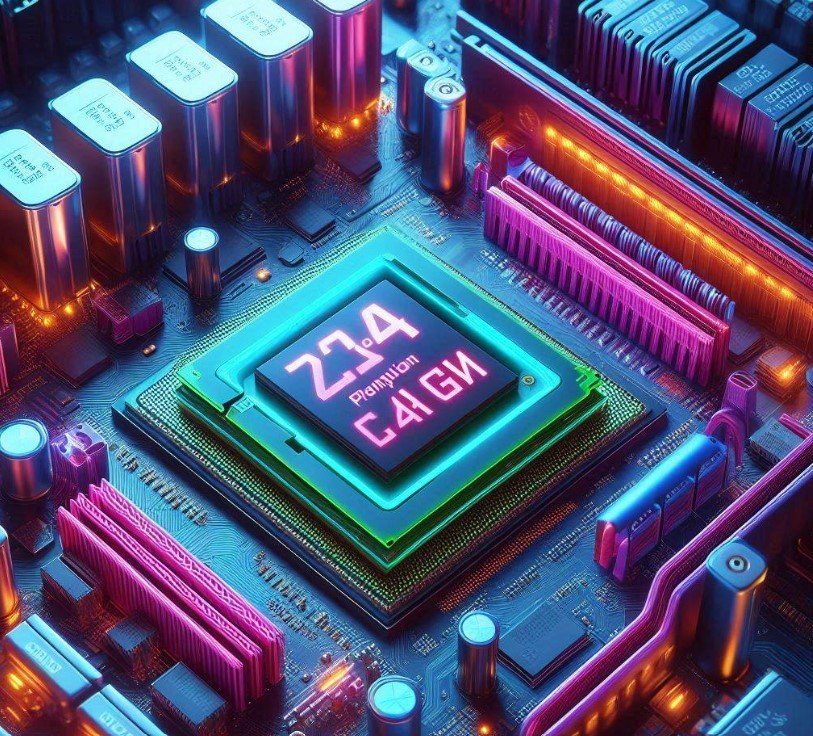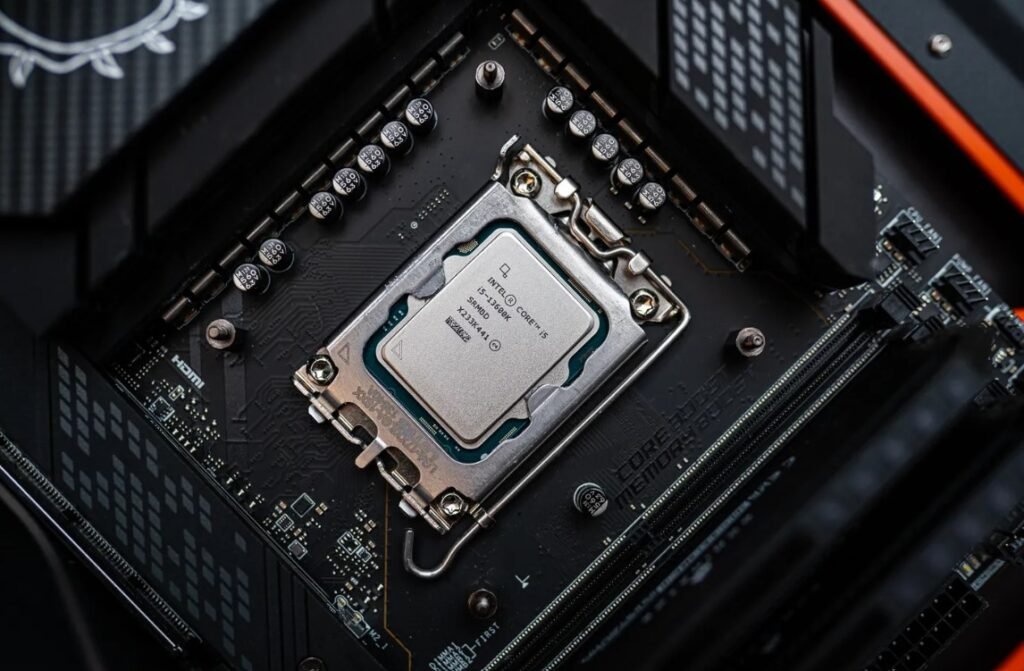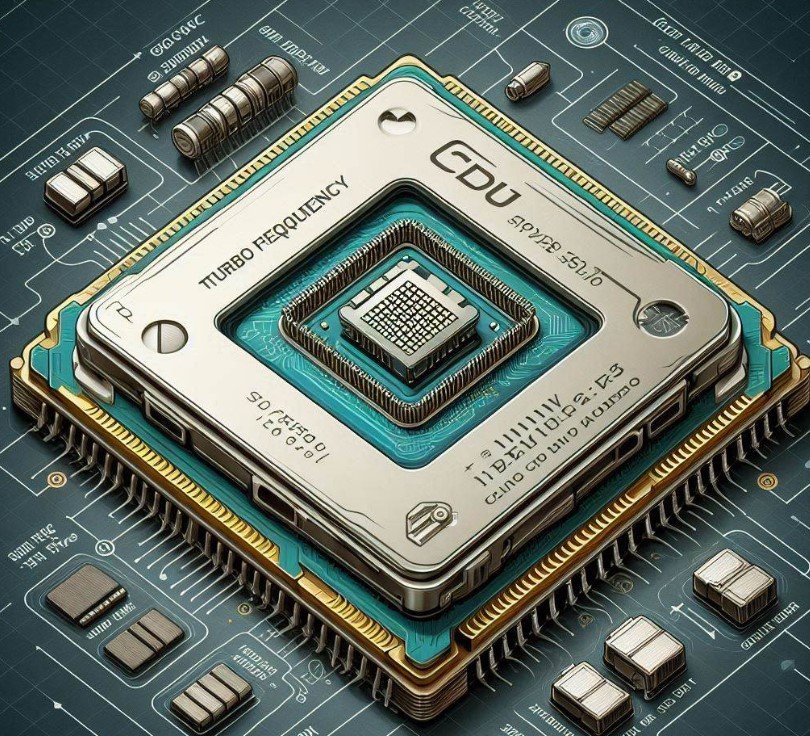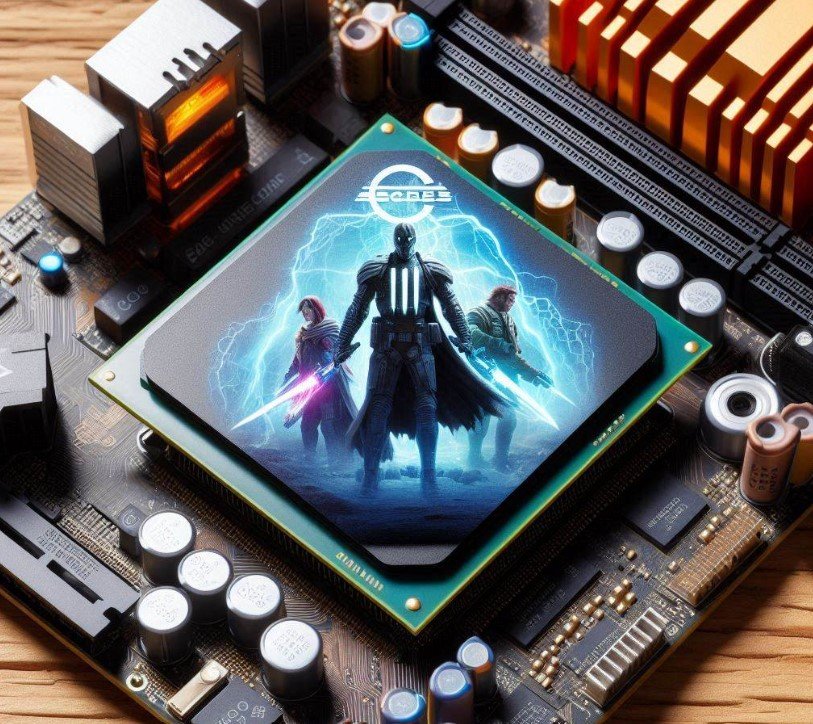Are you looking for What GHz Should My CPU Be For Gaming? The kinds of applications that a laptop will be utilized for will determine the ideal CPU speed for it. An entry-level twin-core processor with a speed of 1.6 GHz is usually sufficient for everyday computing operations, including web browsing, documents, and presentations. This article will examine GHz should my CPU be for gaming?
What GHz Should My CPU Be For Gaming?
CPUs that go up to 3.8GHz or higher are good for power users and supporters, but gamers and content makers who need more power should get a quad-core processor that goes faster than 2.5GHz.

It’s also crucial to take into account turbo boost technology, which lessens the requirement for an extreme CPU by enabling quick spikes in clock speed when needed.
What Is Processor Speed?
The speed at which a computer can process information or commands is measured by its processor. It is recorded in hertz (Hz), which stands for cycles per second and is usually written as gigahertz (GHz).
One of the most crucial aspects of a computer system’s performance is its processor speed. Applications and programs can be run more effectively by the CPU the faster it can execute instructions.
The overall speed at which tasks may be accomplished on a device is determined by the processor speed; this includes both simple operations like opening documents and web pages and more complex ones like gaming and video editing. Increased processing speed can assist in cutting down on lag time while doing several things at once.
How many GHz is good for gaming in 2024?
It’s commonly accepted that a clock speed of 3.5 to 4.0 GHz is ideal for gaming, but single-thread performance is more crucial. This indicates that your CPU is capable of comprehending and finishing single tasks with good performance.

This is not the same as a CPU with a single core. More cores enable your CPU to interpret the instructions for more jobs, and perfect single threading allows it to handle each work effectively on its own.
How many GHz do I need for gaming?
The quantity of work that various CPU cores can do in a clock cycle varies. This is commonly referred to as IPC or Instructions Per Clock. Higher IPC, more cores, and/or more cache are typically found in more sophisticated CPU architectures.
GHz is, therefore, not a reliable measure of CPU performance. Instead, evaluate CPU performance using benchmarks or performance evaluations of particular CPU models in various applications, ideally within the application you intend to utilize.
Passmark, PCMark, and Geekbench are all ok resources if you’re looking for a general CPU benchmark score; however, User benchmarks are awful since they manipulate their test to give better scores to Intel CPUs even if AMD’s CPUs are quicker.
You may be talking about a WiFi band. The distance between your WiFi antenna and router determines the optimal band.
When obstacles (like brick walls) are between the router and the gaming device, 2.4GHz tends to perform better over longer distances, while 5GHz is often preferable over shorter distances.
Is 2.4 GHz processor good for gaming?
A 2.4 GHz CPU can run many games, but it might not be able to handle more demanding ones that require faster clock speeds. Games with a lot of graphics and high processing overhead on the CPU can have slower load times and lower frame rates.

However, it’s crucial to take into account additional elements like the graphics card, RAM, and type of storage that affect how well a game runs. A slower CPU clock, a strong graphics card, and enough RAM can offset speed.
In conclusion, depending on the demands of the games being played, a 2.4 GHz CPU may be appropriate for gaming. For the best gaming experience, it is crucial to take into account the hardware configuration as a whole and make sure it is balanced.
Evaluating a 2.4 GHz CPU for Gaming
System Requirements and Game Optimization
An essential factor to consider when assessing a 2.4 GHz CPU’s suitability for gaming is the system requirements and optimization of the games you plan to play.
The requirements for CPU power and specific core configurations differ between games. Some games depend more on speed with a single thread, while others work best with multiple threads and a lot of cores.
Examine the system requirements of your preferred games before purchasing to see if any of them call for or suggest CPUs with faster clock rates or particular core configurations.
This will help you determine whether a 2.4 GHz CPU can fulfill the performance requirements required for your gaming needs.
Potential Overclocking
The act of raising a CPU’s clock speed to attain greater performance is known as overclocking. A few CPUs feature unlocked multipliers, which make overclocking simpler.
These include some 2.4 GHz variants. A CPU’s ability to overclock can help compensate for a lower clock speed and possibly enhance gaming performance.
It’s crucial to remember that overclocking may result in higher CPU temperatures and power usage. Stable overclocking requires a robust power supply and appropriate cooling solutions.
Furthermore, not every CPU can be overclocked; therefore, before trying any overclocking, make sure you understand the specs of your particular model.
Budget and Upgradability
A 2.4 GHz CPU might be less expensive than high-end CPUs, even if it does not have the fastest clock speed or the most cores.
When creating or upgrading a gaming PC, affordability is a crucial factor to consider. For gamers on a tight budget, a 2.4 GHz CPU can be a good choice.
You can also consider your system’s upgradeability. If you choose a 2.4 GHz CPU at first, you may be able to upgrade to a more powerful CPU later on if money permits. Because of this, you can play games right now and improve your system’s speed later.
The Value of a Harmonious System
In conclusion, it is imperative to stress the importance of a well-balanced system in terms of gaming performance.
Even while the CPU is essential, other parts like the GPU, RAM, and storage are also quite important. If you make sure your entire system is balanced, you’ll experience smoother gaming and better overall performance.
Think about spending money on a strong GPU to enhance your CPU’s capabilities. Having enough RAM and quick storage can also improve gaming performance. To attain optimal performance, it is necessary to evaluate and replace all pertinent components instead of concentrating only on the CPU.
A 2.4 GHz CPU may be appropriate for gaming based on a number of variables, including the system requirements, budget, balance of your gaming system, game optimization, multithreading capabilities, core count, and single-threaded performance.
Even though more cores and faster clock rates are generally preferable, a well-optimized 2.4 GHz CPU with suitable hardware can still provide good gaming performance, particularly for those on a tight budget.
How Fast Are Processors Today?
These days, processors are speedy. A billion instructions may be processed by modern processors, such as those produced by AMD and Intel, in a second.

This is made feasible by the numerous cores and significantly higher clock rates of contemporary processors when compared to earlier processor generations. Users may work on more complex jobs faster thanks to multi-core computers, which enable the simultaneous execution of numerous activities.
These days, a lot of high-end processors may run at up to 5GHz, which translates to five billion data processing operations per second. We can now do so much more than ever before because to computers’ incredible processing capacity, which has revolutionized the industry.
Can processing speed be improved?
Many strategies can be used to increase processing speed. Maintaining the latest recent versions of both your computer’s software and drivers is one of the most crucial things you can do.
By doing this, you can make sure that your system is operating as quickly as possible and that conflicts with out-of-date software will only create slowdowns. Processing speed can also be increased by installing a faster processor or by swapping out an old, weak CPU for a newer, more potent one.
Moreover, increasing RAM (Random Access Memory) can improve speed by enabling quicker data storage and retrieval.
Last but not least, overheating can be prevented by processor cooling solutions like liquid coolers and heatsinks, which will allow your system to function at peak performance without experiencing any lag.
Does Processor Speed Matter?
Processor speed is essential, particularly for heavy applications like gaming. Quicker load times can be achieved with faster processors, giving the user extra gaming time.
They also facilitate multitasking by enabling the seamless operation of numerous programs and applications at once without lagging or slowdowns.
Faster processors also enable higher graphics settings and more excellent frame rates in games, making the experience more fluid and free of noticeable lag.
Processor speed matters even for routine chores like web browsing and document editing since it makes sure that everything works quickly and effectively.
Does processor speed matter for gaming?
Processor speed is essential, particularly for heavy applications like gaming. Quicker load times can be achieved with faster processors, giving the user extra gaming time.
They also facilitate multitasking by enabling the seamless operation of numerous programs and applications at once without lagging or slowdowns.

Faster processors also enable higher graphics settings and more excellent frame rates in games, making the experience more fluid and free of noticeable lag.
Processor speed matters even for routine chores like web browsing and document editing since it makes sure that everything works quickly and effectively.
How is processor speed measured?
Processor speed, which is the number of cycles per second that a CPU can do, is expressed in hertz (Hz). The average speed range for modern CPUs is between 1 to 3.8 gigahertz (GHz), with higher-end ones being able to reach even faster speeds.
The architecture, cache capacity, and clock rate of the CPU are some of the variables that affect how quickly it can operate. The number of transistors, thermal design power, and cores/threads are further crucial features.
Selecting the correct processor type for a given task or application is made simpler by knowing how processor speed is calculated.
What Does Turbo Frequency Mean?
The processor base frequency and maximum turbo frequency are listed in the specifications of Intel processors. The processor’s maximum turbo frequency is the most significant speed it can reach with Intel® Turbo Boost Technology, whereas the processor base frequency describes its typical operating point.

Intel Turbo Boost Technology dynamically increases clock speed to handle demanding workloads. It operates without the user having to install or configure anything. The technology increases clock speed to the highest safe level after determining how much heat the system can withstand and how many cores are in use.
Two fundamental performance indicators, Base Processor Frequency, and Max Turbo Frequency, relate to distinct usage circumstances. The turbo frequency is the more crucial measure for high-intensity gameplay.
This is the speed at which your CPU will function, provided you have enough cooling when handling demanding gaming tasks like traversing a meticulously designed environment or determining an enemy’s next move in a strategy game that requires a lot of processing power.
How Do You Adjust Your CPU Clock Speed?
Overclocking is the process of raising the CPU clock speed in order to increase processing power. As previously indicated, when combined with a motherboard chipset that allows overclocking, Intel CPUs with a K in the name feature an unlocked multiplier that makes overclocking simple.
Overclocking can increase frame rates even for high-end CPUs like the newest generation of Intel® CoreTM processors. For all Intel® processors, Intel® Speed Optimiser offers one-click overclocking. This implies that overclocking performance can be safely optimized by both professionals and novices.
How does CPU clock speed affect gaming performance?
The number of calculations a CPU can do in a second is determined by its clock speed, which has an immediate impact on the CPU’s overall performance. Because they process data more quickly and allow for smoother gameplay, higher clock speeds typically translate into more excellent gaming performance.
Clock speed alone, however, does not solely affect game performance; cache size and core count are other vital considerations.
Even though a 2.4 GHz CPU isn’t as fast as some higher-end models, it can still deliver good gaming performance, particularly when combined with an appropriate graphics card and enough RAM.
Generally speaking, a CPU with a more incredible clock speed would be more advantageous for demanding games and duties.
Are there any advantages of a 2.4 GHz CPU for gaming?
Even though it doesn’t have the fastest clock speed, a 2.4 GHz CPU might still be beneficial for gaming. First, it might be less expensive than more expensive CPUs with quicker clock rates.

Because of this, it’s an affordable choice for gamers with little funds. A 2.4 GHz CPU may also produce less heat and use less power, making a gaming system that is both cooler and more energy-efficient.
In addition, many games these days are made to run well on various computers, including ones with slower clock speeds. Because of this, a 2.4 GHz CPU can run many games smoothly, particularly when combined with a respectable graphics card.
Will a 2.4 GHz CPU be able to run games smoothly?
A game’s ability to operate smoothly depends on several variables, such as its system requirements, the hardware setup overall, and the game’s settings.
A 2.4 GHz CPU can easily manage less demanding games, even though it might not offer the optimum performance for games that require a lot of resources.
Still, if you want to get the most out of a 2.4 GHz CPU for games, you should have a strong graphics card, enough RAM, and do as few things as possible in the background to free up CPU resources.
Can overclocking improve the gaming performance of a 2.4 GHz CPU?
Overclocking can enhance gaming performance by raising a CPU’s clock speed over its factory specifications.
However, it is crucial to remember that not all CPUs are made to be overclocked, and if done incorrectly, this could void warranties and harm the CPU.
A 2.4 GHz CPU may be able to be overclocked to higher clock speeds, but how much better gaming performance it achieves depends on several variables, including stability, cooling capacity, and the CPU’s design.
If you’re thinking of going this route, make sure you do your homework, adhere to safe overclocking techniques, and use sufficient cooling solutions.
Should I consider upgrading to a higher clock-speed CPU for gaming?
Depending on your demands, financial situation, and the games you want to play, consider upgrading to a CPU with a faster clock speed for gaming.
Upgrading to a faster CPU may noticeably enhance gaming performance if you often play graphically demanding games or work on chores that require a lot of computing power.
Prior to upgrading, though, take into account other aspects, including your motherboard’s compatibility with the new CPU, your current system arrangement, and the upgrade’s cost. It’s advised to investigate and weigh the advantages of various CPUs’ performance before choosing one.
Conclusion
A CPU with a higher clock speed, such as 3 GHz or above, is advised for a more fluid gaming experience. This will guarantee that the processor is capable of handling the demanding computations and operations needed for contemporary games. To optimize gaming performance, it’s also critical to take other aspects like the GPU, RAM, and system configuration into account.
The clock speed of a processor is a good way to judge how well it works generally. Many modern video games still benchmark best on CPUs with the fastest clock speed, despite the fact that multi-core performance is acknowledged to be essential for applications like video editing and streaming.
Frequently Asked Questions
Is 2.4 GHz fast enough for gaming?
The 5 GHz and 6 GHz bands are advised for applications such as home theatre, gaming, and home offices that require a lot of voice and video calls. WiFi’s best effort network, 2.4 GHz, is perfect for transferring modest amounts of data across extended distances.
Is a processor’s 2.40 GHz speed suitable?
For simple operations, a frequency of 1.6 GHz to 2.5 GHz is suitable. The majority of laptops available now have twin-core CPUs, which are ideal for regular users. For the majority of users, including light gamers, 2.5 GHz to 3.5 GHz is perfect. For pros and gamers, 3.5 GHz and higher is optimal.
Which CPU GHz is best for gaming?
It’s commonly accepted that a clock speed of 3.5 to 4.0 GHz is ideal for gaming, but single-thread performance is more crucial. This indicates that your CPU is capable of comprehending and finishing single tasks with good performance.
Is 2.5 GHz good for gaming?
Yes, you can play many games with ease, but you may find it difficult to play the most demanding ones at high settings.






